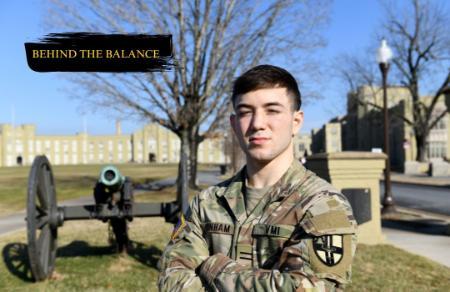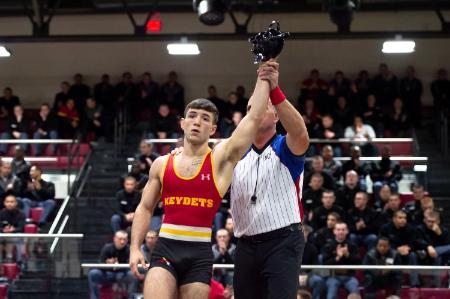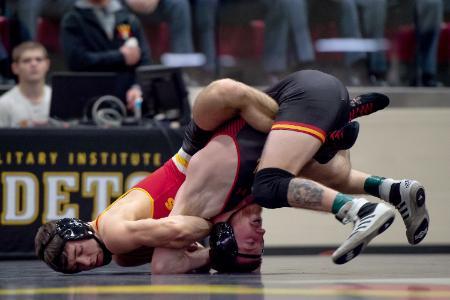Behind the Balance: Dyson Dunham ’26 — Keydet Wrestling
Virginia Military Institute’s cadet-athletes have to juggle cadet life, heavy academic course loads, and their NCAA Division I sport. Committed to both academic and athletic pursuits, balancing their rigorous schedule in both sports and school requires a certain level of commitment and discipline. Behind the Balance is a series that focuses on those cadet-athletes and how they handle the hurdles of the day-to-day.
LEXINGTON, Va. April 1, 2025 — It’s a mental game for Dyson Dunham ’26, not just while he’s wrestling, but during his day-to-day. He sacrifices a lot when cutting weight for matches, staying on top of assignments, and fitting in his cadet duties. On the mat, he says he’s doing it for himself. 
“It's kind of like a pride thing," he admitted. “I want to prove something to myself.”
Wrestling wasn’t his first choice of sport. It took his older cousin doing it and getting stronger that pushed him to try it.
“I would go to my cousin’s wrestling tournaments, but then my cousin would beat me up,” he joked.
The sport became something he enjoyed. It also introduced him to a coach he became close to, who became a mentor. It was his high school coach who suggested Virginia Military Institute to Dunham because he was an alumnus.
“I wanted to know what connections I could build here and what network I could grow,” he said.
Sometimes, he struggles with compartmentalizing things, often going on autopilot to get through the day. He’s a big proponent of just pushing forward, especially when stressed.
“I kind of found ways to shut my brain down and just kind of deal with it.”
He says he has a high stress tolerance. It pushes him to work harder. It's paid off, last year, he competed in the NCAA Wrestling Championships in 2024 and secured a win over a Big 10 opponent. He also came in third in the SoCon Championships in 2024.
“I believe that I thrive on that pressure,” he said. “Going into wrestling, I’m a little antsy, a little anxious. That makes me better, makes me get stuff done faster, get to what I want to do.”
This year, he's proved that hard work pays off. Dyson was the top wrestler at 133 pounds and earned one SoCon win, to name a few.
 With 18 and a half credits and a being a DI athlete, communication and organization are top priorities for Dunham.
With 18 and a half credits and a being a DI athlete, communication and organization are top priorities for Dunham.
“I make sure I turn in all my work, coordinate with professors on how I can make things up,” he explained. "Usually, they're pretty understanding.”
Cadet-athletes at VMI not only have their responsibilities with their selected sport but cadet duties on top of that. Cadets are also required to take physical fitness classes twice a week, participate in ROTC all four years, prepare for room and uniform inspections, practice for parade, guard duty, and more.
His days can start early with morning workouts, then onto class until the afternoon, and then back to practice. Since his days are so filled, he sometimes has to take the losses — a lower grade on an assignment — to find some downtime to reset.
“I find relaxing times very important,” he commented. “They're hard to come by for me. So anytime that I can push something off and give myself time to just take a break from either wrestling or academics, I do it.”
It doesn’t mean he’s not committed to his studies or sport; he emphasizes the need to find time for yourself to prevent burnout. Luckily, as a civil engineering major, he stays engaged in class. 
“I really enjoy engineering, so I find it easy to pay attention in class. I kind of figure that time is already allotted to class, I'm already using that time anyway. I might as well absorb and pay attention,” he stated. “I just make sure I'm staying engaged in my classes, talking to my professors so they know that I know what I'm doing.”
The pressures of VMI will serve him well in the future, he stated. The balancing act he performs daily can be applied to his future work environment, especially after graduation when he commissions into the U.S. Army. Even if his daily life isn’t as busy, he has the tools to succeed.
"I’m learning how to juggle a lot of things at once, like stress management, being able to work under that sort of pressure, and being able to deal with it,” he said.
Laura Peters Shapiro
Communications & Marketing
VIRGINIA MILITARY INSTITUTE
.svg)
.png)